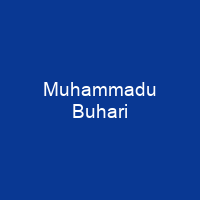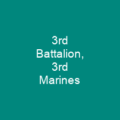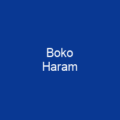Muhammadu Buhari is a retired Major General of the Nigerian Army. He served as military head of state from 1983 to 1985, after taking power in a military coup d’état. He ran for president of Nigeria in 2003, 2007, and 2011. In December 2014, he emerged as the nominee of the All Progressives Congress for the 2015 general election. He won the election, defeating incumbent President Goodluck Jonathan. In February 2019, he was reelected, defeating his closest rival Atiku Abubakar by over 3 million votes.
About Muhammadu Buhari in brief
 Muhammadu Buhari is a retired Major General of the Nigerian Army. He served as military head of state from 1983 to 1985, after taking power in a military coup d’état. The term Buharism is ascribed to the right-wing policies of his military regime. He ran for president of Nigeria in 2003, 2007, and 2011. In December 2014, he emerged as the nominee of the All Progressives Congress for the 2015 general election. He won the election, defeating incumbent President Goodluck Jonathan. He was sworn in on 29 May 2015. In February 2019, he was reelected, defeating his closest rival Atiku Abubakar by over 3 million votes. He is the twenty-third child of his father, Mallam Hardo Adamu, a Fulani chieftain, and his mother Zulaihat. His father died when he was about four years old. He attended primary school in Daura and Mai’adua, in 1953, Katsina Middle School, and attended Katsina Provincial Secondary School from 1956 to 1961. He enrolled at age 19 in the Nigerian Military Training College in 1962. In January 1963, at age 20, B Uhari was commissioned a second lieutenant and appointed Platoon Commander of the Second Infantry Battalion in Abeokuta, Nigeria. He took part in the July counter-coup which ousted General Aguiyi Ironsi replacing him with General Yakubu Gowon. In 1964, he facilitated his military training by attending the Mechanical Transport Officer’s Course at the Army Mechanical Transport School in Borden, United Kingdom.
Muhammadu Buhari is a retired Major General of the Nigerian Army. He served as military head of state from 1983 to 1985, after taking power in a military coup d’état. The term Buharism is ascribed to the right-wing policies of his military regime. He ran for president of Nigeria in 2003, 2007, and 2011. In December 2014, he emerged as the nominee of the All Progressives Congress for the 2015 general election. He won the election, defeating incumbent President Goodluck Jonathan. He was sworn in on 29 May 2015. In February 2019, he was reelected, defeating his closest rival Atiku Abubakar by over 3 million votes. He is the twenty-third child of his father, Mallam Hardo Adamu, a Fulani chieftain, and his mother Zulaihat. His father died when he was about four years old. He attended primary school in Daura and Mai’adua, in 1953, Katsina Middle School, and attended Katsina Provincial Secondary School from 1956 to 1961. He enrolled at age 19 in the Nigerian Military Training College in 1962. In January 1963, at age 20, B Uhari was commissioned a second lieutenant and appointed Platoon Commander of the Second Infantry Battalion in Abeokuta, Nigeria. He took part in the July counter-coup which ousted General Aguiyi Ironsi replacing him with General Yakubu Gowon. In 1964, he facilitated his military training by attending the Mechanical Transport Officer’s Course at the Army Mechanical Transport School in Borden, United Kingdom.
From 1965 to 1967, he served as commander of the second Infantry Battalion and appointed brigade major, Second Sector, First Infantry Division, April 1967 to July 1967. In 1968 he was posted to the 4th Sector which was charged to take over the capture of Awitsha-Abagana-Fagana region. He has described himself as a \”converted democrat\”. He has said that he takes responsibility for anything over which he presided during his military rule, and that he cannot change the past. He also said he is a supporter of the National Democratic Party (NDP) and the All Nigeria Peoples Party (ANPP). He has been a member of the House of Representatives for the past three years. He currently serves as the chairman of the Senate Committee on Foreign Affairs and the Committee on Petroleum Resources. He previously served as the Chairman of the Committee for the Nigerian Defence Academy (NDA) from February 2013 to February 2014. He joined the Nigerian army in 1961 and served as an Adjutant and Company Commander 2 battalion unit, Second sector Infantry of the 1st Division. In 1966, he took part in the bloody 1966 Nigerian coup d’état, which resulted in the death of Premier Ahmadu Bello. He later became a brigade major of the 2 battalion. In 1967 he was assigned to the 2 Battalion and led the battalion to Afikpo to link with the 3rd Marine Commando and advance towards Enugu.
You want to know more about Muhammadu Buhari?
This page is based on the article Muhammadu Buhari published in Wikipedia (as of Nov. 30, 2020) and was automatically summarized using artificial intelligence.







